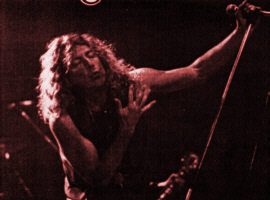
Led Zeppelin’s Revived Corpse Is Surprisingly Lively

Jimmy Page/Robert Plant
At the Pacific Coliseum on Friday, May 26, 1995
By ALEXANDER VARTY of The Georgia Straight
I'm still shocked. I trudged out to the Pacific Coliseum dutifully enough, intent on covering this reunion of two pensionable superstars with as such objectivity as I could muster but not expecting anything more than a tame trip down memory lane. At the end of the show, though, I walked off dizzy and grinning, any residual cynicism utterly wiped away by one of the most powerful, innovative, and musical shows ever to grace the stage of our now-redundant hockey arena.
Jimmy Page and Robert Plant did the impossible. Not only did they resurrect the rotting corpse of Led Zeppelin, they pumped it so full of fresh blood that it capered acrobatically across the stage in a series of brilliant re-inventions of songs I’d thought were long ago consigned to history. Even this show's failings were essential: there were a couple of moments when things threatened to collapse into a vortex of miscues and sloppy timing, but that just served to prove that it was a real, flesh-and-blood band up there in the glare of the lights, not, like Pink Floyd, some computer-controlled simulacrum or, like the Eagles, a bunch of money-grubbing, separate-limo, not-on-speaking-terms hacks. The smiles on Page and Plant's faces were as real as the grin on mine.
In fact, they were having the best time of anyone in the room, with the possible exception of the young musicians who joined them onstage. Drummer Mike Lee and bassist Charlie Jones combined to produce a sledge-hammer attack not unlike that made famous by Zeppelin's John Paul Jones/John Bonham rhythm team, but they tempered their muscle with a more sinuous approach on the acoustic songs. (Jones was especially impressive on upright bass, not so much for his fingering as for his huge tone.) Former Cure guitarist Porl Thompson threw himself into his parts with physical gusto, and the decision to hand him some of Page's more intricate leads was a wise one; he executed them with verve, leaving the older guitarist to concentrate on a less precise but more atmospheric attack. Thompson also provided a hint of just how into this music the whole ensemble was: even when he stepped offstage during a Plant/Page duet, he could he observed playing furious ham-bone percussion behind one of the speaker stacks.
The basic band was joined at various points by Ed Shearmur on Hammond organ and synthesizer and Nigel Eaton on hurdy-gurdy and mandolin, as well as by a small string orchestra (largely drawn from the ranks of the VSO) and an eight-piece Middle Eastern band introduced as the Egyptian Pharaohs. None of these additions in any way compromised the evening's effectiveness as a rock concert. The amplified roar of Eaton's hurdy-gurdy was every hit us psychedelic as Page's brief theremin-and-Echoplex assisted visit to outer space; Shearmur's arrangements and passionate performances from the string players kept the orchestral padding from becoming overly saccharine (and Babayaga violist Marie-Claude Brunet's hair-flipping antics gave Plant a run for his shampoo money); the Egyptians (and in particular violinist Wael Abu Bakr, whose solo turn was the most musically entrancing moment of a long and intense concert) underlined the folk and world-music elements of a band whose importance in developing an audience for such esoterica has been somewhat underestimated.
No Led Zeppelin fan could have been disappointed by the set list, which included all of the expected hits (save for "Rock 'n' Roll") plus a few bonuses: a slow blues, a Cure song, and a couple of the most gripping tunes from Plant's solo career-which, it's interesting to note, Page played with as much focus us anything from his own pen. The show closed with the predictably rousing "Kashmir", but that was about the only thing predictable about this remarkable concert, and even it was made new again thanks to a couple of particularly thrilling Egyptian interpolations.
I'm even looking forward to the live album that will inevitably emerge from this tour; if Friday's performance is any indication, it should thoroughly eclipse the reunion effort, No Quarter, that set this whole process in motion.